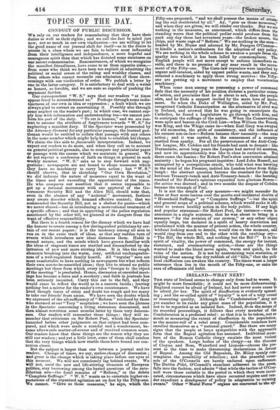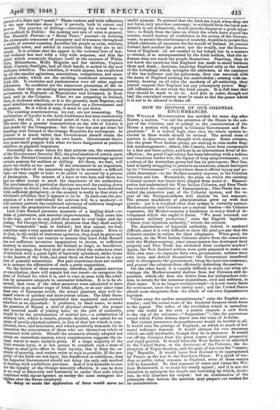IRELAND—WHAT NEXT?
THE state of Ireland seems to change only from bad to worse. It might be more formidable ; it could not be more disheartening. England cannot be afraid of Ireland, but had never more cause to be afraid for her. The spirit of disaffection is evidently spread- ing; and the so-called spirit of "loyalty" is not of a very sound or reassuring quality. Although the " Confederation" pay not yet number in its ranks any great mass of the population, it is not to be regarded as an isolated fact. Indeed, from tbe terms of its recorded proceedings, it follows that every member of the Confederation is a professed rebel : so that it is to be taken, not so much as measuring the extent of disaffection in the population, as the muster-roll of a rebel army. Considerable numbers have enrolled themselves as a "national guard." But there are many signs that the people at large sympathize with the aggressive form that the Repeal agitation has assumed. Individual mem- bers of the Roman Catholic clergy emulate the most violent of the speakers. Large bodies of the clergy—as the dioceses of Cloyne and Ross, Waterford and Lismore—choose the pre- sent as the time to make threatening declarations in favour of Repeal. Among the Old Repealers, Dr. Miley openly con- templates the possibility of rebellion ; and the peaceful coun- sels of the O'Connells are barely endured upon sufferance. The Dublin Pilot, O'Connell's stanchest adherent in the press, falls into the fashion, and admits "that while the tactics of O'Con- nell were those suitable to the period in which they were incul- cated, circumstances which have since occurred require and ren- der expedient a development of policy in adaptation to existing events." Other "Moral Force" organs are converted to the ap- proyal of a force not "moral." These various and wide adhesions to the new doctrine show bow it prevails, both in extent and power. The practice of drilling—exercising for actual war—is not confined to Dublin : the making and sale of arms is general. The Dundalk Patriot—a "Moral Force" journal—in noticing the systematic armament of peasantry and townsmen throughout a circle of several counties, describes the people as calm, resolute, unusually sober, and settled in conviction that they are to tri- umph. It is evident that the appeal to the national love of law- less violence has met with a very wide response, and that the spirit which commonly displays itself in the excesses of White- boys, Ribandmen, Molly Maguire and her children, Captain Rock, Captain Starlight, and all their bands, is united in the new inchoate rebellion. The rebellion, it would appear, has swallowed up all the smaller agitations, associations, conspiracies, and assas- sination-clubs, which are the exciting condiment necessary to Irish life. It overrides and predominates over all other cognate influences. So confident are the numerous promoters of the re- bellion, that they are making arrangements to raise simultaneous movements in England—at Manchester and Liverpool, in Scot- land, and in the Colonies. What we see preparing in Ireland, then, is inchoate rebellion, or it is the grossest, most flagrant, and most mischievous imposture ever practised on a Government and an empire. Be it which it may, it must be put down.
The existing counteractives, we say, are not reassuring. The
declaration of loyalty to the Lord-Lieutenant has been numerously signed ; but still, in a national point of view, it is exceptional. The most like a general demonstration on the side of loyalty is that made by the Orangemen : but the time has not yet come for handing over Ireland to the Orange Royalists for reconquest. At present it is much better, that Government should retain the maintenance of authority in its own hands. Government there- fore must itself grapple with what we have designated as positive rebellion or gigantic imposture.
Ostensibly the steps taken for that purpose are, the enactment of the Government Security Bill, the proclamation of certain parts under the District Coercion Act, and the legal proceedings against certain persons for sedition or drilling. All these we fear, will prove too feeble or too small. If the armament be an imposture, either the whole of the impostors ought to be arrested—a difficult task—or they ought at least to be called to account by a process of decimation. The seizure of a knot or two here and there has had no effect except to mark the impotence of the authorities. The proclamation of particular districts was well for putting down disturbance in detail ; but either its rigours have not been enforced with sufficient atringency, or the country is really in that state of wholesale rebellion that it appears to be in. In such case the pro- secution of a few individuals for sedition will be a mockery—it will neither prevent the continued utterance of seditious language nor arrest the preparatives for armed rebellion.
Lord John Russell promises measures of a healing kind—re-
dress of grievances, and material improvements. They come late in the day, and to do any good they must be very large and im- posing. Sir George Grey, indeed, promises that they shall satisfy every "reasonable" man in Ireland ; but that appeal, we fear, concerns only a very minute section of the Irish people. Even to do that, in the midst of traitorous agitation, they must be great and striking. We will not venture to assume that Lord John Russell has not sufficient inventive imagination to devise, or sufficient mastery to mature, measures for Ireland so large, so beneficent, and so imposing, that they shall at once blind the audacious stare of rebellion with a great light of heavenly splendour, strike home to the hearts of the Irish, and send them on their knees in a pas- sion of grateful submission. But past experience does not enable us to assume the affirmative of such a great supposition.
On the failure of these measures, therefore, of partial coercion
or conciliation, there will remain but one resort—to recognize the state of Ireland for what it is, and to cope at once with the rebel- lion by measures adequate to encounter rebellion. It is to be ob- served, that even if the other measures were calculated to have succeeded at an earlier stage of Irish affairs, or at any other time than one of European revolt, the actual juncture may well de- mand others of quicker and more potent action. The Irish them- selves have not generally repudiated this organized and avowed rebellion as an imposture : it professes, in their name, to make the question of Repeal a trial of physical strength : the proper and received mode of joining issue, on the part of authority, would be by the proclamation of martial law,—a substitution of military law, which is simple, prompt, decided, and suited for an arena of purely physical contest, in lieu of that law which is com- plicated, slow, and indecisive and which positively demands for its execution the concurrence of those who are themselves rebels or associated with rebels. Should the measures already adopted not attain an immediate success, every consideration suggests the in- stant resort to more decisive plans. If a large majority of the Irish remain loyal, it is but justice to establish such a state of things as shall give effect to their loyalty, free it from the co- ercion of anarchy, and restore order as soon as possible. If the ma- jority of the Irish are not loyal, but disaffected or rebellious, then the Imperial Government should not delay the only safe method of dealing with a rebellious province. And if it is desirable to ren- der the loyalty of the Orange minority effective, it can be done in no way so discreetly and humanely as under that code which combines with rigour against an enemy the most stringent dis- cipline over the forces employed.
To -delay or evade the application of force would serve no
useful purpose. To pretend that the Irish are loyal, when they are not loyal, only provokes contempt; to withhold from the loyal per- mission to act defensively, would provoke disgust at a gross injus- tice ; to flinch from the issue on which the rebels have placed the contest, would destroy all confidence in the power of the Govern- ment; to permit the continuance of anarchy, would be to permit that which obstructs all measures for the beneht of Ireland. At present Ireland feels neither the power, nor the wealth, nor the benevo- lence of England : all are exerted in her behalf, but in a manner an stinted, or so misrepresented by the Irish leaders, that the in- fluence does not reach the people themselves. Starving, they do not know the exertions that England has made to stand between them and death ; destitute, knowing England only as the island of the Lotophagi which inveigles the absentees, as the employer of the tax-collector and the policeman, they can associate with the name of England nothing but malevolence ; arming withim- punity, hearing on all sides the mockery of all authority; they cannot suppose that England has any peremptory power. sag- lish influences do not reach the Irish people. It is full time that they should be made to do so. And first in order, though not last, the convulsed country must be made to feel the power which it is not to be allowed to shake off.



























 Previous page
Previous page